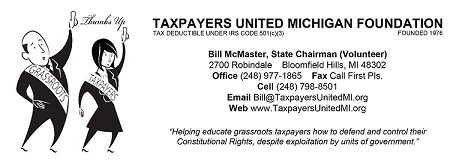Two-thirds and 46,…two numbers Gary Glenn held forth as he kicked off a local drive for a part-time legislature.
Glenn, who is running to represent the 98th House District, spoke Thursday at Dan Dan the Mattress Man in Midland about putting a state constitutional amendment on the Nov. 4 ballot.
“I know it is not every day that somebody that is running for the legislature runs on the platform of cutting his salary by two-thirds before he even gets there,” said Glenn, a board member of the sponsoring organization, The Committee to Restore Michigan’s Part-time Legislature (CRMPTL). “But, certainly that is part of the mindset I am going to try to maintain if I am blessed to be elected to this position, is to represent what the taxpayers believe is best for the state of Michigan.”
The “46” stands for the number of states that already have part-time legislatures. Only Pennsylvania, California, New York and Michigan have full-time legislatures.
“This is the best response to any objection anybody brings up to Michigan moving back to a part-time legislature,” said Glenn. “That refers to the fact that 46 states, 92 percent of the states in this country, operate today with a part-time legislature. The state of Texas only meets every other year. Before the 1963 Constitution, Michigan had a part-time legislature. They used to have one staffer for every four legislators.”
And Glenn shared that he believes the people of Michigan want a part-time legislature.
“I haven’t seen any scientific polls yet, but all the online polls are polling 80 percent of Michigan returning to a part-time legislature,” he said.
Under the new proposal, a legislature would only meet in one 60-day regular session per year.
“What this means is they are going to have to get the important things done,” said Glenn. “They are not going to pass these frivolous bills.”
For that part-time position, lawmakers would earn $35,000 per year versus approximately $71,000 now.
“Now that is just salary; if you take the $71,000 per year salary and add in the benefits like health insurance, it is over $100,000,” said Glenn. “Obviously, you are going to save some money. Maybe $10 million a year in legislative compensation, not counting the savings you would have by cutting the staff support.”
The proposal would limit the total number of staff to 250 for the 148 legislators (38 Senate and 110 House).
“That means there would be more than one per legislator,” said Glenn.
The amendment received an endorsement from U.S. Congressman Tim Walberg, R-Tipton.
“Having been one of the handful of legislators back in 1983-86 unsuccessfully pushing for a part-time legislature, I wish you well. Feel free to tout me as an endorser of the part-time drive,” Walberg wrote in an e-mail to Glenn.
The drive needs to collect 322,609 signatures by July 7. However, due to possible invalid signatures, the goal is to collect well over 400,000.
“It is going be done by a citizen-led effort,” said Glenn. “There are no plans, we would certainly solicit (any) contributions.”
Midland County Commissioner Rich Keenan, R-4th District, who was among the 25 in attendance, was concerned about how term limits and a part-time legislature would mix.
“I agree with a part-time legislature,” he said. “We pay them full-time, but they are just part-time right now. They don’t meet very often. As a part-time commissioner I’m finding that once I stepped in as county commissioner, it took me two years just to figure out what is going on because I’m part-time. If you are going to have term limits: in six years, will your legislator have any clue what to do in Lansing if he is only there a little bit? I think we have to consider what our part-time legislature would be.”
To contact CRMPTL, visit: parttimemi.com




